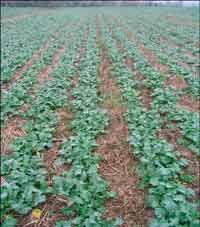Cereal volunteers bigger threat to oilseed rape this autumn

The threat of volunteer cereals on establishing oilseed rape could be extremely high this season, as a result of the protracted and difficult harvest, according to one oilseed rape specialist.
This summer many fields suffered high levels of seed shedding and above normal combining losses in challenging conditions; a 1.5% loss on a 10t/ha crop equates to about 4.7m seeds/ha, said Gary Jobling, oilseed rape manager at Syngenta. That is roughly equivalent to double the typical sowing rate of a winter wheat crop.
In practice, the damaging effects from volunteer cereal competition may have even greater consequence on oilseed rape than drilling date, since the most intense competition comes during periods of good growing conditions, when the rape seedlings have the best chance of establishing strongly.
ADAS trials have shown early removal of even modest volunteer cereal infestations with fluazifop-P-butyl (Fusilade Max) when they are still small (GS12-13) gave nearly 20% yield increase over untreated, but if left for a further two to four weeks resulted in serious yield loss.
“Growers have clearly identified sowing date as an important element of getting rape established for the winter, but if volunteer competition checks growth for even a few days during the optimum autumn conditions the benefits could be lost,” claims Mr Jobling. As drilling continues, growers must aim to avoid any hold up in the establishment of later sown crops overwhelmed by swathes of volunteers.
“The fast action of Fusilade Max quickly stops the uptake of water and nutrients that are essential for emerging rape seedlings. The rapid die-back of treated plants ensures seedlings get the maximum light to establish strong branched growth habit and rapid ground cover to deter pigeons landing in the crop” he advises.
With the continued move to growing hybrid varieties, along with the trend to lower seed rates in conventional varieties, successful autumn establishment is imperative. Min-till establishment of oilseed rape is typically more susceptible to early volunteer competition, and frequently successive flushes of volunteers, highlights Mr Jobling.
“It’s a good strategy to take out the first flush of volunteer cereals and susceptible small grass weeds with Fusilade Max, and then tackle less competitive broadleaved weeds and other grass weeds, along with any secondary flush of volunteers, using an alternative herbicide option,” he adds.

